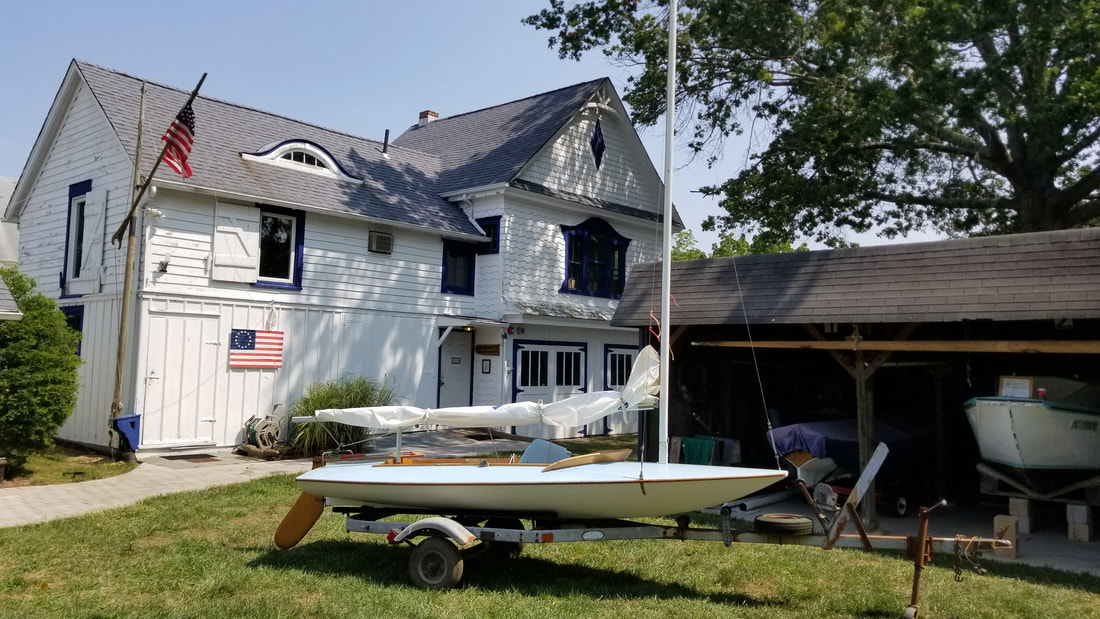|
Welcome to Toms River Seaport Society’s (Mari)Time-Warp, taking our supporters back through the nautical history of the Barnegat Bay and Toms River watershed areas!
Today we learn about controversy from overfishing along the Jersey shore, as covered by the Philadelphia Inquirer on August 21st, 1894 and rediscovered thanks to Newspapers.com.
MENHADEN MEN FISHERMEN'S FOE
Fish Steamers' Big Purse Nets Ruining Sport on the Jersey Coast. Blockade the Inlets and Scoop in Thousands of Food Fish. Pound Nets Aid in the Slaughter. Legislation to Protect the Fishing Industry Needed--One of the Chief Attractions of the Seaside Resorts in Danger Special to The Inquirer. TOMS RIVER, N.J., Aug. 20.--If something is not speedily done to stop the encroachments of pond fishermen on the one hand, and of menaden steamers on the other, the angling along the Jersey shore will be a matter of history and of tradition only in a very few years' time. Of the two evils the menhaden fishermen are the most destructive. Fitted out with swift steamers and large crews, they cruise along the shores, particularly in the neighborhood of the inlets, where the fish are seeking the quieter and fresher waters of the bays and thoroughfares for spawning places. With large purse nets they take everything from the smallest menhaden or "mossbunkers"--as the shore fishermen call them--up to the largest of blue and weakfish, sea bass, rock fish and all that is going. It is no uncommon thing to count on a clear summer's day from twelve to fifteen of these steamers plying their trade within a radius of two or three miles, either at Barnegat Inlet or anywhere along Island and Squan beaches. With the utmost of assurance they stand right in the mouths of the inlets and scoop the waters of the teeming millions of fish that have always made the bays their spawning ground. To the inhabitants of New Jersey's shore, whether it be the hotel men who have millions of dollars invested in hotels at the various resorts, or the poor fisherman, whose whole outfit is a bank skiff and a few band lines with which he has to make his daily bread, the worst feature of this piracy is that it is almost all done by fishermen from other localities.
GREEDY MENHADEN MEN
The menhaden oil factories were first started down in Maine and when the waters of the Eastern States were depleted of these small and non-edible fish, which form the principal food of the blue fish, the menhaden men turned their attention to the coast of New Jersey, but the native fishermen have never taken kindly to the business. Hence 80 per cent. of the menhaden fishermen who are scooping the fish from the coast of New Jersey are from either Maine, Rhode Island, Connecticut or Long Island. At the mouth of the Mullica are two factories that employ three steamers between them, and one of these steamers in one week's time during July landed at the Adams factory, New Gretna, 712,000 fish. Any day scores of these steamers may be seen in a short trip along the coast. The menhaden men claim that the fish they take are not fit for food, but the nets they use are intended to catch the small mossbunkers, hence it is impossible for the larger fish to escape. Where the bunkers are, also, it is always found that they are followed by shoals of blue fish and other game and food fish. Hence it is impossible to surround them with the purse nets without inclosing the food fish also. But all are bunkers which once get into the nets of the menhaden boats. There seems to be no way under present laws of restricting this wholesale slaughter of food fish. Twelve years ago A.C.B. Havens, then Senator from Ocean County, after a hard fight succeeded in passing three bills in the Legislature which would have stopped the evil, but Governor Ludlow, on a very labored opinion from Attorney-General Stockton, allowed the bills to die. During General William J. Sewell's term as United States Senator he attempted to get Congress to take action in the matter. But New Jersey stood alone. The Western Congressmen thought it no concern of theirs, the New England representatives were in the interest of the capital invested in the fish oil factories, and the South Atlantic States were not awake to the fact that they would be the next to suffer from the menhaden pirates. So nothing has been done, and in 1892 the fish factory men had the audacity to introduce a bill, which was favorably reported in the Fisheries Committee, allowing purse net fishing in all inlets, bays and rivers under the jurisdiction of the United States. But the very audacity of this bill killed it.
THE DEADLY FISH POUND
The fish pounds from Mantoloking up to Sandy Hook are becoming almost a destroyer of the food fish as are menhaden steamers. To be sure, the fish pounds are stationary, while the steamers cruise after the fish everywhere, but the pounds are built in the very lines of travel always pursued by the food fish, and with long outstretched wings take in whole schools of fish. At Elberon and Sea Bright this summer between three and four hundred thousand pounds have been caught in two days. The immense shoals of fish crowded in the pounds cause large numbers of them to die and render them unmarketable. Senator Bradley, at Asbury Park, has been compelled to keep men patrolling the beach to pick up these dead fish. So many fish have been caught in the past three weeks by these pounds that the city markets have been glutted and thousands and thousands of pounds of fish had to be thrown away. Not only is there no apparent law to prevent these depredations of ocean fishermen, but net fishermen have become so bold that in the close waters of Barnegat Bay in defiance of law they scoop with drift nets the channels, both day and night. Where a few years ago there were sheepshead shipped by the hundreds of pounds daily to the city markets, now there is hardly one of that gamy fish to be found. Ten years ago it was by no means uncommon for fishing parties in Barnegat Bay to catch from six hundred to a thousand weakfish in a few hours' time. Now two hundred is boasted of for days, and the party that gets a half dozen fish apiece is considered as doing fairly well. Notwithstanding the direct law that no nets must be used in Barnegat Bay from May 1 to November 1, ever since the weakfish entered the bay last June the channels have been swept by nets.
New Jersey's game laws are supposed to be enforced by a Game and Fish Commission consisting of George Pfeifier, Jr., of Camden; Parker W. Page, of Summit; W. Campbell Clark, of Newark; and Howard P. Frothingham, of Mt. Arlington. Thomas Maskell, of Morristown, is State Game and Fish Protector, and each county has two Fish Wardens. The wardens patrol the inland streams but make no effort to enforce the law along the coast.
The hotel proprietors and property owners along the shore are beginning to recognize the fact that if it were devoid of its attraction as a fishing resort it would lose many of its most frequent visitors, and a movement has been started to check the menhaden pirates and net fishermen who are depleting the fish supply.
FOOD FISH MUST BE PROTECTED
Captain Ike Jennings, of Harvey Cedars, says: "The menhaden fishermen are certainly ruining the hook and line fishing. Where there are plenty of young menhaden for food there you will always find good fishing. But these menhaden steamers send their boats within a few yards of shore, between the bar and the beach, and scoop up everything that can be found, so that nowadays squidding for blue fish in the surf is almost a thing of the past. Only this week I counted eight menhaden steamers right off Harvey Cedars. The United States should unite with Great Britain--as that country long since requested us to--and forbid menhaden fishing within three miles and a half of land." Pilot Commissioner Henry C. Gulick, of Barnegat, says practically the same thing. Ex-Senator A.C.B. Havens, now clerk of Ocean County, has long made the fishing interests a study. He says: "The State should assume authority to act in the case of the menhaden fishermen." Captain Jacob Birdsall, of Waretown, says: "I have counted this summer as many as fourteen menhaden steamers lying at the mouth of Barnegat Bay, directly in the Inlet. Net fishing must be abolished, and the fish pound as well, or angling at the Jersey coast resorts will be wiped out, and it will be a short time only when there will be no fish in Barnegat Bay."
At Forked River, Byron E. Eno, proprietor of the Riverside House, who has made salt water fish conditions a study for years says: "Menhaden fishing is destroying one of the largest industries along our coast, and is beside seriously endangering our food supply. Before the advent of the menhaden and pound fishermen hundreds and thousands of families along the Jersey coast were comfortably supported by hook and line fishing, the market was steady, never glutted and the supply was sufficient. The menhaden boats diminished the supply and caused the introduction of the fish pound to supply the market. I think they should be compelled to keep off shore at least seven miles."
These are sample opinions of the influential men along the shore on the menhaden question, and a sentiment is being created by these marauders that will result in a determined effort to protect food fish along the New Jersey coast. Enjoyed this article?
|
NEWSArchives
May 2024
Categories |
OPEN TUES/THURS/SAT 10 to 2
Barnegat Bay Maritime MuseumVertical Divider
|
Upcoming EventsVertical Divider
|
|
© Barnegat Bay Maritime Museum. All rights reserved.









 RSS Feed
RSS Feed
